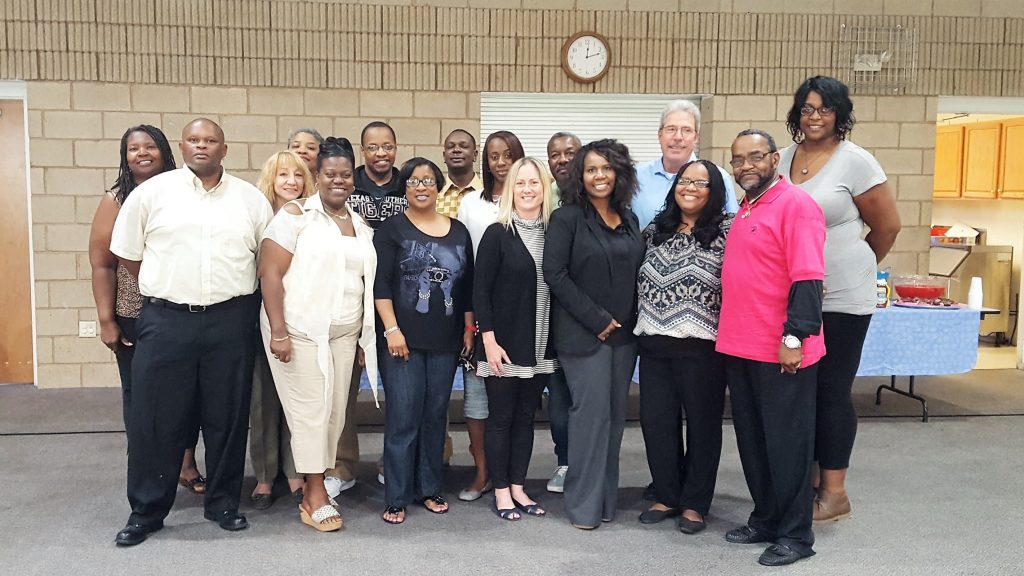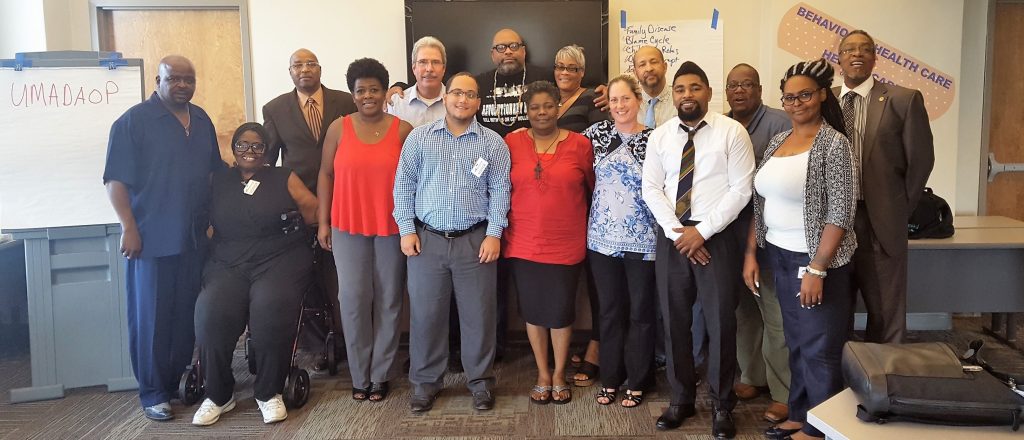Ohio CLFC Roll-Out
Ohio’s Statewide Roll-Out of the CLFC Curriculum Series
Akron Training Participants Receive CLFC Certification! See Below

Names from left to right: Darlene Beecher, David A. Smith, Kim Conner, Georgia Stephens, Celeste Rodgers, James Brown, Jennifer Moree-Brown, Shawn Bonner, LaShana Bolden, Teresa Boyd-Strader, Sherman Moore Sr., Chandra Bryant, Ted N. Strader, Phyllis Price, Eddie Beasley and LaShonda Allen
Over the last few years, a growing national movement has advocated for criminal justice reform with an emphasis on post-incarceration services for returning citizens (former inmates) and their families. The state of Ohio is at the forefront of this movement. The Buckeye State has a long history of commitment to promoting healthy individuals, families and communities. Starting at the end of 2015, Officials from the Ohio Department of Mental Health and Addiction Services (OhioMHAS), Office of Prevention and Wellness, initiated a statewide rollout of the Creating Lasting Family Connections® (CLFC) Curriculum Series as the focal point of their Children of Incarcerated Parents (COIP) project. The overarching goal of COIP is to mobilize service systems throughout the state to build resiliency, develop resistance skills for substance use and address trauma in children of incarcerated parents and their families using the CLFC Curriculum Series.
OhioMHAS awarded the CLFC implementation grant to the Urban Minority Alcoholism and Drug Abuse Outreach Program (UMADAOP), a federation of 11 agencies across Ohio strategically poised to fulfill the ambitious goals of the project. Under the leadership of Dennis A. Baker of the Mansfield UMADAOP, the Federation will bring together 11 UMADAOP programs, the Ohio Department of Rehabilitation and Corrections (ORDC) and other State and Regional partners to fulfill the goals of the statewide project. The University of Ohio is evaluating the COIP project. University of Ohio evaluators from the esteemed Voinovich School of Leadership and Public Affairs collaborate with the Pacific Institute for Research and Evaluation (PIRE) and are conducting rigorous, multi-layered research on the project.
Representatives from OhioMHAS, UMADAOP, SheRay’s, Ohio University, PIRE, COPES, Resilient Futures Network (RFN) and other interested organizations make up the Ohio statewide coordinating committee. This committee is currently implementing plans for fulfilling all stated grant activities.
Since the last newsletter, we have initiated the first several phases of the statewide rollout. We have conducted 5 regional Overviews in the following Ohio cities:
- Mansfield
- Akron
- Athens
- Cincinnati
- Toledo
These Overviews were designed to inform and recruit potential new partners for participation in the project. The Overviews included a review and discussion of the Children of Incarcerated Parents (COIP) project, a brief history of CLFC, COPES and the Resilient Futures Network (RFN), the Creating Lasting Family Connections® (CLFC) Curriculum Series Philosophy and Approach and the CLFC National Training System. In the Overviews, staff also discussed programmatic expectations of COIP partner agencies, outlined the COIP Project Evaluation plan developed by Ohio University/PIRE Evaluation Team and answered general questions about the project.
During the summer, we began the second phase of the COIP Project, by initiating CLFC Implementation Trainings in cities across Ohio to train and certify individuals to be able to provide the CLFC Curriculum Series with groups of participants in their own communities. The three separate CLFC Implementation Trainings (Original CLFC Program, CLFC Fatherhood Program: Family Reintegration and the Marriage Enhancement Program) are designed to be conducted in 3-Day segments:
- A Combined CLFC Fatherhood and Original CLFC Program = 9-Day CLFC Fatherhood Program training (three, 3-day segments)
- The CLFC Marriage Enhancement = 3 full days of training
Several Cleveland Participants Gather for Picture at CLFC Certification Ceremony

Names from left to right: Wayne “Seti” Richardson, Carol Jean Gates, Carl Motley, Mary K. Williams, Ted N. Strader, Roberto Colon, Fred B. Ward, Sheila Calloway, Syn Dlyt, Teresa Boyd-Strader, Owen Taylor, Anthony Hubbard, Rev. Jerome Rivers and Daisetta Harris and Deacon Mike Davis
We have completed CLFC Implementation Trainings in both Akron and in Mansfield. Both CLFC Implementation Trainings trained and certified local professionals to provide both the Original CLFC Program and the CLFC Fatherhood Program with groups of participants in their home communities.
Evaluations from these first two CLFC Implementation Trainings have been quite positive:
- 100% of trainees reported that the information they received was Very Useful (92.9%) or Useful (7.1%)
- 100% of trainees reported that they agreed with the CLFC philosophy
- 92.3% of trainees reported that they were Very Satisfied (84.6%) or Satisfied (7.7%) with the quality of the training materials
- 88.9% of trainees said they were Very Satisfied (66.7%) or Satisfied (22.2%) overall with the training
Further, we have completed the first 3 days of a CLFC Implementation Training in Toledo. Additional CLFC Implementation Trainings are now scheduled in Cincinnati and Columbus through the end of the year. Booster (refresher) trainings will also be provided, as needed, to agencies and individuals across Ohio to ensure curriculum comprehension, implementation fidelity and continuous quality improvement.
In the coming months, some of those individuals who have received training and certification to implement CLFC will be expected to implement CLFC with groups in their own communities and, if interested, to apply for CLFC Master Trainer Training. The statewide coordinating team will then select eligible candidates for CLFC Master Trainer Training from the pool of applicants. CLFC Master Trainer Trainings will be conducted in the spring or summer of 2017. These CLFC Master Trainers will assume long-term training of trainer responsibilities in order to sustain the effort for years to come.
All agencies involved with this statewide rollout share a common passion to build resiliency in Ohio families, to promote the well-being of children of incarcerated parents and their families to stem the tide of intergenerational trauma, substance use disorders, criminal justice involvement, incarceration and prison recidivism. OhioMHAS, UMADAOP, SheRay’s, Ohio University, PIRE, COPES and RFN stand ready and are deeply engaged and committed to translating this nationwide call for criminal justice reform into statewide action across Ohio. This statewide partnership is focused on “Creating Lasting Family Connections” in order to accomplish smooth and successful reentry for parents and intergenerational prevention for their children.



